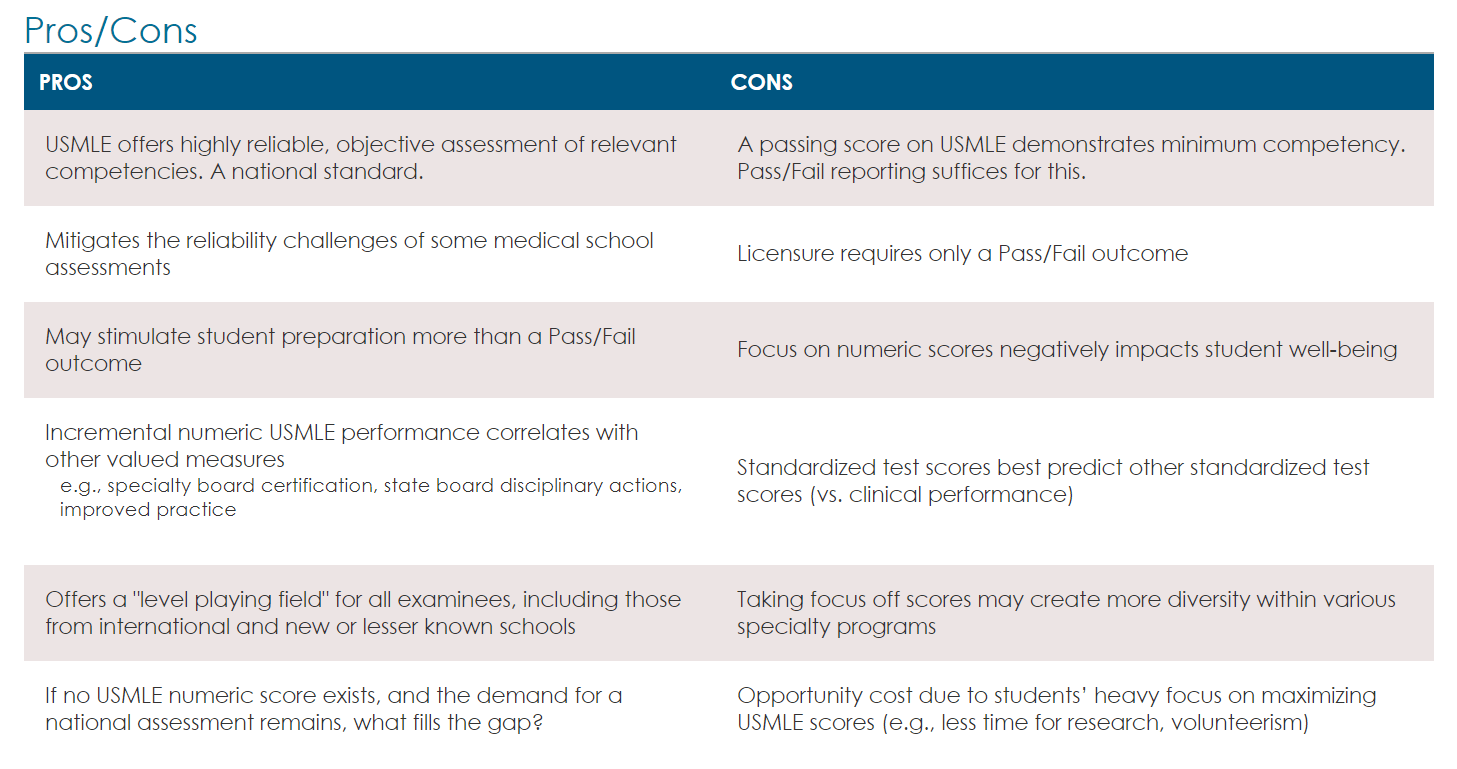USMLE Step 1 to Become Pass/Fail

22096 Views
USMLE Step 1 is now pass/fail. What does that mean for you?
Earlier today, the Invitational Conference on USMLE Scoring (InCUS) announced that the USMLE Step 1 is set to become pass/fail beginning January 1st, 2022.
This change in policy has significant implications for current first year medical students and all future classes of incoming medical students. In this blog post we will lay out the reported changes and some immediate effects. In subsequent posts we will address downstream effects. Most importantly we will be providing advice on what you, a current medical student, should do while studying for USMLE Step 1.
_______________________________________________________________________
Key Points:
- If you anticipate taking USMLE Step 1 before January 1st, 2022, fortunately or unfortunately, this decision will have little to no impact on your preparation for the exam.
- If you anticipate taking USMLE Step 1 after January 1st, 2022, your USMLE Step 2CK score, shelf exam performance, medical school, and grades (if they exist) just got a whole lot more important.
_______________________________________________________________________
Why is USMLE Step 1 Switching to Pass/Fail?
The InCUS explained the logic behind the decision on the USMLE website. It seems to boil down to three primary factors: intended purpose of the USMLE exams, perceived parallel curriculum, and student well-being.
Speaking on the intended purpose of the exam, InCUS provides the following statement: “An examinee’s USMLE scores are reported to medical licensing authorities for their use in the decision to grant a provisional license to practice in a post-graduate training program and the decision to grant an initial license for the independent practice of medicine.”
In simple terms, this means the USMLE Step 1 is meant to confirm a medical student is knowledgeable and competent enough to work as a junior doctor under supervision of senior doctors.
While this has always been the “primary purpose” of the USMLE, InCUS further notes that, “Because residency programs use USMLE scores as a means to screen and select applicants, examinees strive to obtain the highest possible scores. This use of the score is considered a secondary use of USMLE scores. USMLE was not designed for these purposes and the program did not envision the markedly increased reliance on numeric scores in graduate medical education.”
Again, in simple terms, the USMLE was not intended to be a defacto SAT or MCAT for comparing medical students against each other. Because it was being used this way, the test was being overused by residencies and overemphasized by students.
Given the latter statement, transitioning USMLE Step 1 toward pass/fail is a bold attempt on behalf of USMLE co-sponsors (the Federation of State Medical Boards (FSMB) and the National Board of Medical Examiners (NBME)) to restore the role of the USMLE exams to their original intended purpose.
Additionally, InCUS states that the switch to a pass/fail USMLE Step 1 is intended to combat the problem of a ‘parallel curriculum’ or ‘hidden curriculum’ that has been progressively overwhelming the existing curriculum at medical schools nationwide.
At Elite Medical Prep, we know first-hand the frustration that this ‘parallel curriculum’ has created for medical students and their medical school administrators and faculty. Our customized programs at Mt Sinai, UNLV, Ben Gurion, and Technion have involved extensive discussions with leaders in medical education. Likewise we have presented research and engaged in symposia on changes in the USMLE at major medical education conferences.
InCUS says, “emphasis on maximizing USMLE scores has led medical school students to the perception of a “parallel curriculum” to the curriculum of their medical schools. Students engage in their school’s curriculum while simultaneously preparing for what is perceived to be “other material” important for achieving high scores on the USMLE assessments.” While InCUS attempts to be diplomatic in its statement here, the reality is that many medical students have begun abandoning parts of their medical school curriculum that are less relevant to USMLE Step 1 preparation. Because the goal is to achieve a competitive USMLE Step 1 score, students often do not attend lectures or labs, many opting instead for independent learning. Many students have told us in recent years that, “If I skip class, I can spend more time on USMLE Step 1 prep and get ahead when dedicated rolls around.”
Near the end of the report, InCUS also mentions briefly that, “medical school faculty and staff have noted potentially negative effects of preparation for high-stakes testing on student well-being”
Again, in simple terms, student stress levels are going through the roof and the Step 1 exam preparation is thought to be the main culprit.
Switching the USMLE Step 1 to pass/fail is intended to alleviate that stress. At Elite Medical Prep, we know that many medical schools have been increasingly attentive to the mental and emotional health of their students, especially related to Step 1. We offer customized Step 1 review courses and small group tutoring programs at several schools including Mt. Sinai School of Medicine and UNLV School of Medicine. As part of these programs, we offer continued support for students throughout the Step 1 dedicated preparation period via email support and our own in-house learning advisor who coordinates with the administration and learning support staff at those medical schools.
What does USMLE Step 1 becoming pass/fail actually mean for medical students?
Current Medical Students
If you anticipate taking USMLE Step 1 before January 1st, 2022, fortunately or unfortunately, this decision will have little to no impact on your preparation for the exam. Since you will still receive a numerical score on Step 1, residency programs will still evaluate you based upon your Step 1 and Step 2CK scores the way they have been doing for years.
Future Medical Students & Applying to Residency Programs
Now, before we begin speculating upon what the Step 1 pass/fail change will mean for future students, we want to show the Pros/Cons chart that InCUS released following the decision. (The Pros column reflects why a Step 1 numerical score was a positive. The Cons column expresses why a Step 1 numerical score is considered unnecessary or negative.)
Looking at the Pros column, we can see that there are some particularly important areas that switching USMLE Step 1 to pass/fail will dramatically impact.
For medical students, if you will be taking USMLE Step 1 in late 2021, this means that when it is time to apply to residency, you may be going up against other applicants who have taken USMLE Step 1 as pass/fail. This means that your USMLE Step 2CK score, shelf exam performance, medical school, and grades (if they exist) just got a whole lot more important.
USMLE Step 2 CK
While it is possible that residency programs will now begin evaluating applicants based upon more qualitative factors, the reality is that many residency program directors will now put greater weight on your USMLE Step 2CK score. As the only remaining numerical USMLE score before residency applications, we predict that USMLE Step 2CK will become increasingly important to residency matching in competitive programs. Anecdotal evidence from our MD tutors who have served on resident selection committees is that Step 2CK was already becoming more important to program directors, even before today’s announcement. This trend will now dramatically accelerate, with much greater emphasis being placed on clinical diagnosis and management and less on the underlying basic science knowledge.
Shelf Exam Performance
Along with your Step 2CK score, Shelf exam performance will likely now become more important than ever before.The Shelf exams at the end of clinical rotations are a major predictor of Step 2CK performance. Grading clinical rotations is often dependent on the Shelf exam score, and achieving clinical honors already has an important impact on matching into competitive residencies. The stress of Step 1 prep is likely to shift towards Shelf exam preparation.
Medical School Rank and Prestige
Moving away from standardized exam scores is also likely to give students from higher ranked medical schools a significant advantage over students from lower ranked medical schools when applying to residency programs. As the above chart stated, reliance on standardized test scores has helped in the past to “level the playing field”. This often means helping top-performing IMGs and students from smaller or less known medical schools obtain interviews at and matches in their preferred residency programs. However, if residency programs no longer have the quantitative benchmark that is USMLE Step 1 to help their decision-making, they will likely put greater weight on other factors in evaluating residency candidates. Candidates from well known, highly-selective American medical schools will likely then be favored in competitive residency programs.
A collateral implication is that the MCAT may become more important, as your MCAT score remains a major determinant of where you attend medical school.
If you have further questions about what the USMLE Step 1 score change from numeric to pass/fail means for you, please do not hesitate to contact us here. In addition, if you have a USMLE Step 1 test date before January 1st, 2022 and would like help preparing, please take a look at our USMLE Step 1 tutoring page if 1-on-1 tutoring could be right for you.
Featured Articles

